O Welche Lust (Oh, What Joy) – Prisoners’ Chorus in Fidelio
O Welche Lust (Oh, What Joy) – Prisoners’ Chorus in Fidelio
For almost two centuries, Beethoven’s Fidelio has enjoyed a very special place in the world of opera. Its celebration of married love at its most elevated, along with the triumph of political freedom over the forces of tyranny, has ensured Fidelio a mythic status — akin to Beethoven’s own Ninth Symphony — in much of the world. It is a work of art which offers a well-nigh religious, awe-inspiring experience in its honoring of the very best of human nature. “(Fidelio) is an ode to nobility of soul and the dignity of man,” is the way one author put it, quite correctly.
Beethoven – Fidelio – Prisoners’ Chorus
The plot is simple: the heroine Leonore disguises herself as a man (Fidelio) to penetrate a prison where the evil Don Pizarro is holding her husband Florestan. Rocco, a prison warden who gives Leonore a job, is instructed to kill Florestan but is in two minds. Finding the wretched man in a forgotten dungeon, Leonore confronts Don Pizarro. Enter the benevolent minister Fernando, who releases the prisoner and restores justice. Though officially set in Spain, it’s hard not to think of the Bastille and Revolutionary France – with the king a Napoleon-figure.
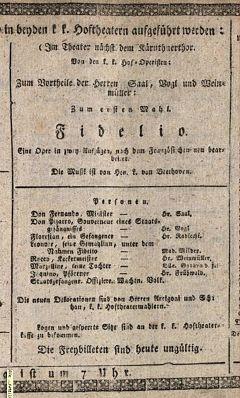
Playbill of the first performance, 1814
The Act I finale begins with the famous prisoner’s chorus – this men-only ensemble in four-part harmony is a beautiful, expansive, and wistful musical exclamation of the prisoners’ first glimpse of the sun after years of being held captive within the dark prison. The awe and wonder they express, along with the hesitation to embrace any sense of hope, is ever present in their singing. The act ends with the prisoners being led back into their cells singing “Leb’ wohl, du warmes Sonnenlicht” (“Farewell, warm sunlight”).
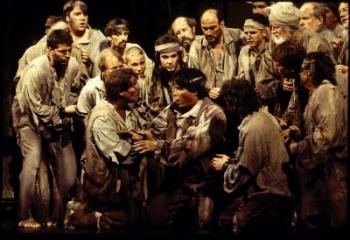
Prisoners Chorus, Utah 1999
The prisoners’ chorus is the operas ideological core. The men, nearly blinded by the sunlight, straggle onto the stage above quiet unfolding chords in the strings. A hopeful upward-reaching motif, passing from low to high wood-winds, introduces their first tentative words, after which their voices quickly swell to fortissimo as they greed the open air with a rapturous tribute to freedom. The emphatically harmonized choral melody rides above string and wood-wind semiquavers that lend it and optimistic forward momentum, interrupted only by an anxious allusion (on a unison chromatic descent near the bottom of the register) to the tomb-like dungeon they have just left. In the middle section, set in bright G major, a single prisoner (a tenor) steps forward and, in a lovely, confident melody, sings of his hope that with God’s help they will be free, to which the others respond with a series of ecstatic ejaculations. They are brought back to grim reality by a second soloist (a bass) who warns that they are watched. (At this moment a sentry appears on the wall and the departs, presumable to inform Pizarro that the prisoners have been let out.) The opening chorus returns (piano), but the prisoners cannot escape their oppressive awareness of being under surveillance, and the number ends, over descending string figures that die away to nothing, with them repeating, ‘We are watched with ear and eye.’
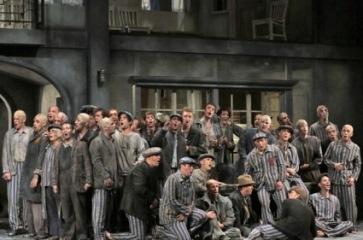
Prisoners Chorus, Santa Fe 2014
There is no question this is gorgeous music—a terrific 7-minute chorus in the style of a German Männerchor. But how does it propel the drama? It doesn’t. Absolutely nothing happens on stage during the chorus, and the theme of its text is only incidental to the opera. For all the lofty philosophizing about freedom and liberty in this chorus, the opera itself is about the love of a woman for her husband, and her bravery. A brave wife’s love is what the final chorus celebrates, and what the original subtitle of the opera underscored. This is another example where Beethoven’s remarkable music is far more important than the dramatic pacing or the story at this point.
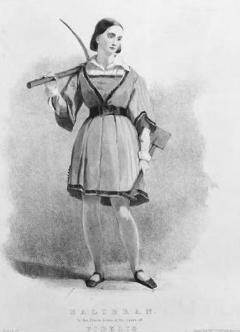
Maria Malibranas as Leonore, 1836
With Beethoven’s Fidelio, there is more than enough compensation for the weaknesses in dramatic pacing and libretto. Wilhelm Fürtwangler, the great German conductor, once observed, “Fidelio is not an opera in the sense we are used to, nor is Beethoven a musician for the theater, or a dramaturgist. He is quite a bit more, a whole musician, and beyond that, a saint and a visionary.”
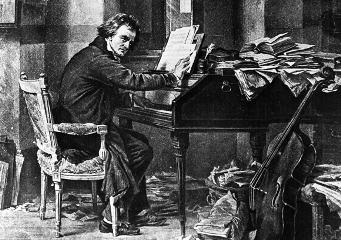
Ludwig van Beethoven
CHOR DER GEFANGENEN
O Welche Lust, in Freier Luft Den Atem leicht zu heben! Nur hier, nur hier ist Leben! Der Kerker eine Gruft. ERSTER GEFANGENER Wir wollen mit Vertrauen Auf Gottes Hilfe bauen! Die Hoffnung flüstert sanft mir zu: Wir werden frei, wir finden Ruh ALLE ANDEREN O Himmel! Rettung! Welch ein Glück! O Freiheit! Kehrst du zurück? ZWEITE GEFANGENER Sprecht leise haltet euch zurück! Wir sicht belauscht mit Ohr und Blick.
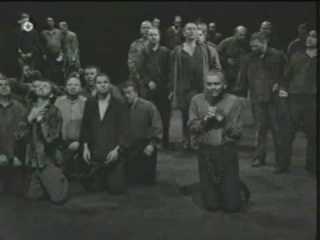
Prisoners Chorus, Berlin 1963
CHORUS OF PRISONERS
Oh what joy, in the open air Freely to breathe again! Up here alone is life! The dungeon is a grave. FIRST PRISONER We shall with all our faith Trust in the help of God! Hope whispers softly in my ears! We shall be free, we shall find peace. ALL THE OTHERS Oh Heaven! Salvation! Happiness! Oh Freedom! Will you be given us? SECOND PRISONER Speak softly, restrain yourselves! We are observer by ear and eye.
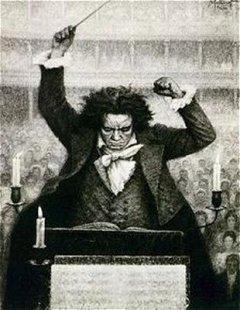
Ludwig van Beethoven








